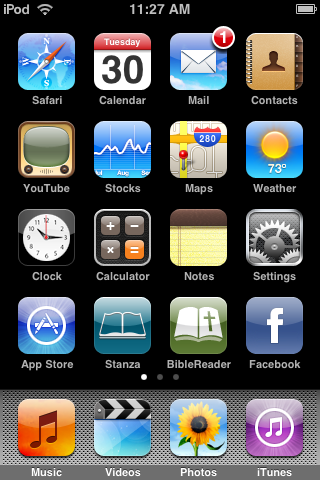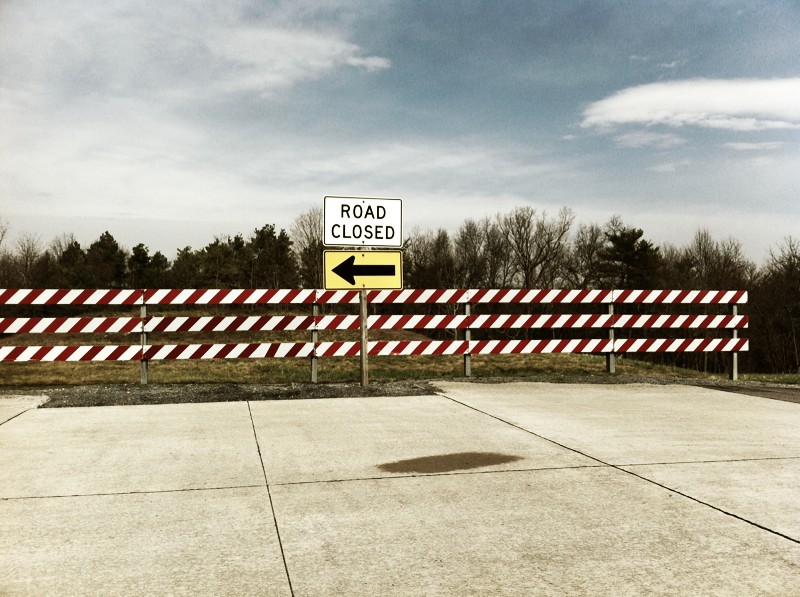There is much debate about whether Apple’s ecosystem (iTunes/App Store/iPhone/iPad) is an attempt to control your life or simply offer you a good consumer experience. The Unofficial Apple Weblog has a link to a post and commentary suggesting that the iPad and the whole Apple system is akin to AOL. You remember AOL, the old AOL I mean, who offered you all the internet without any of the muss and fuss. Of course that AOL died out once folks realized they could use Netscape for themselves.
John Battelle’s post cited by TUAW is titled, “Is The iPad A Disappointment? Depends When You Sold Your AOL Stock.” He argues that the iPad will fail
in the long term, in particular if Apple doesn’t change its tune on how the iPad interacts with the web.
He then goes on to say that the iPad does not really interact with the web, or at least apps cannot link to the web. And this, he argues will be the downfall of the iPad. Except I can get access to anything (non-Flash, granted) [mfn]In my day to day use I rarely find myself saying, “Darn! If only I could access this Flash content on my iPad.” I just don’t miss it.[/mfn] on the web through my iPad. OK maybe a programmer can’t always get at what she wants directly within the app, but many apps I use (newsreaders, twitter, BBC) link out to the web via Safari. So I think that this prediction of John’s like his earlier prediction that the iPad would fail, is likely to be wrong.
TUAW, however, phrases the question differently and made me think of a different metaphor.
AOL was a “walled garden” of their content, and as long as Apple maintains its grip on the App Store, it’s that same garden; each app works within its own flower pot, almost completely independent of the others.
I have often heard people, as alluded to in my introduction, say that they object to Apple controlling so tightly what can go into their app store. Last night Steve Jobs apparently referred to this as the “curated” approach where 95% of the apps are approved, so long as they don’t crash and use the public API. Those less generous say that it is a walled off place, hidden and protected, BUT what we really want and need is open and freely available software. Now I won’t get into the religious wars of open source software. Instead I offer a different metaphor, that of an old fashioned store.
The App Store is not so much a garden as a grocery store or, to be more direct, computer store, with items clearly labeled, boxed, and vetted. Remember when you used to have to buy software in a box, with floppies and maybe even a manual? One of the benefits of that system was that you knew where the software was coming from, you had some assurance that this copy of Fox Pro was actually made by Fox Software and was not, in fact, a trojan horse designed to bring your system down.
Some may say that I am being an Apple apologeticist, it has happened in the past, but this seems to me the best of both worlds. I can download my software without having to go to a brick store, but I have some assurance that what I am getting is legitimate and will not harm my machine. Yes, it is a controlled environment, but as with food, medicine, and motor vehicles I think quality control is a positive, not a negative.





5 thoughts on “A “walled garden” or a grocery store?”
I think the problem is not the controlled environment–it’s that the environment is so *tightly* controlled by a private company. I’ve been running Ubuntu Linux on my desktop PC for quite a while now and they have implemented a “Software Centre” that works much like Apple’s “app store.” Software is available there with one click (downloaded, installed, and ready to go). The environment is very controlled. What’s the difference? (a) You can choose whether to use the “Software Centre” or (if you’re brave) bypass it. (b) You are given several fields of software with different levels of security: Ubuntu supported software, Ubuntu partner software, Universe, and Multiverse. You decide how broad (and risky) you want your software choices to be. (c) You can add new “repositories” (think of it as extra stores) if there is software you want that Ubuntu doesn’t list anywhere in its default store.
I know that not everyone is a fan of Linux, but I think this is an example of a model that takes the best of Apple’s design but frees it from Apple’s obsessive control. Yes, Apple has done the best interface design (overall) anywhere in computing. But do I want Apple to decide what I can access without any ability to “opt out” or “opt in” to other choices? That is the surest road to a monopoly–and when we’re talking about the ipad as the primary vector for our media content, a monopoly is pretty scary to me. Don’t we think it’s a *bad* idea when all of the newspapers are owned by the same company?
Coming from the tech industry, “walled garden” is actually a fairly precise and technical term (see http://www.roughtype.com/archives/2008/01/replanting_the.php and http://www.roughtype.com/archives/2006/09/the_unusual_wor.php).
Walled garden specifically means a service which refuses to operate with other services. A vertical stack of software. Vertical being creation/production->shipping->operation. Think of hollywood. Congress broke up companies with vertical stacks of production and distribution to create competition. Apple writes closed stacks, only ever opening the creation/production. So other people can write software that produces content into Apple’s vertical stack.
Nothing about a vertical stack, per se, causes a monopoly. Only the inability to compete with the stack creates the monopoly. Competition, and losing, is what has been happening lately. The good news is that Apple is not a content creator. They create the stack. People have to create content to fill the stack. That is the difference from AOL – who was the sole producer. Sure AOL bought content to add, but no one person could add to the greater whole. Apple is just acting as censor. Apple is opt-in. Choice is ours.
The Good Thing(tm) is that content creators can choose to create both for Apple and other platforms like Android, and the web in general.
JohnO thank you for providing me with the specific knowledge regarding “walled garden” as a technical term. I did not know that. I too agree that while Apple clearly has controlling tendencies it is not a monopoly. We do have choice.
I like the grocery store analogy, but you didn’t go where I thought you were going to.
I thought you were going to go with the “General Store” analogy where Mr Ike (remember the Waltons?) would be behind the counter. You would go the counter with your mom’s list and he would get everything for you. No real choice in manufacturer of flour, or sugar, or even fabric. You bought what he bought, and brought.
Then we had the advent of the supermarket. You, the consumer, could now peruse from a vast array of similar products, deciding which ones of the myriad choices was right for you. Let’s take my favorite example: tomato paste. You want Heinz? Hunts? Giant store brand? Great Value? You want 4 oz? 8? 16? 32? The killer 64 oz? The assortment just of tomato based products is staggering–yet all choices we have.
Our choices remain limited by that which Walmart, or Giant, or Wegman’s chooses to stock, but (at least in the 2 former cases) they are limited by fiscal and physical constraints, and not some artistic and aesthetic focus.
If you don’t like the choices at one grocery store, you can simply go to another.
Apple is somewhere between these. They aren’t limiting us to only one choice (but oh happy day if we only could be annoyed by one fart app instead of 300!)
Apple however does limit choice. They not only control the store, but they won’t let you go to another store (without forcing you to make ‘unauthorized changes” to your device. Now, I hear the response–“you can go to another store–get a different phone!” But that’s not really the same.
In the analogy of the grocery store I have a device that I use to consume a product (my stomach, and all pertinences attached thereto). I am able to choose between a selection of products that I consume, but the device of consumption stays the same.
In the Apple model, I am forced to forgo a consumption device (one that might have a large number of appealing factors) for the “option” to consume a different assortment of products.
I don’t see why it has to be “either, or.” This Cartesian Anxiety must stop. Tell us that we are “safest” if we shop in the company store. But let us choose (perhaps through an “opt in” feature that won’t cause nightmares with firmware updates) to choose a different store. Let the consumer decide on the risks of consumption, while allowing us to have the same consumption device.
Does Apple not have the “Stomach” for that?